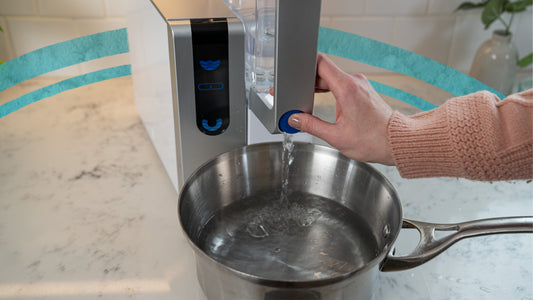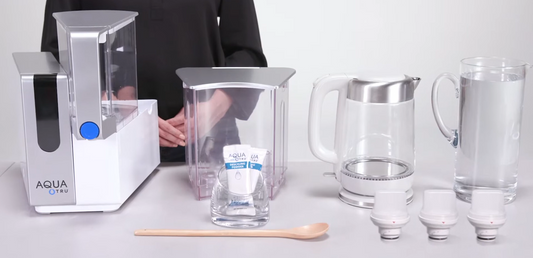Clean water often gets taken for granted in our modern lives, flowing effortlessly from our taps, and filling our glasses. Yet, within this pure liquid, an invisible threat might lie: water contaminants. These unwelcome intruders can not only compromise the taste of our water but also impact our health in ways we might not even realise. As we discuss the intricate relationship between water contaminants and allergies, it becomes evident that our water quality directly affects our well-being.
Statistics: grasping the scale of allergies
The UK's National Health Service (NHS) statistics paint a stark picture. In the UK alone, it is estimated that over 44% of adults suffer from at least one allergy. The prevalence of allergies is rising, and environmental factors, including water quality, significantly exacerbate these conditions.
Water quality and allergies
For many, allergies are integral to daily life, affecting millions across the UK and the EU. What might seem like a harmless sip of water can sometimes trigger allergic reactions in allergy sensitive individuals. Water contaminants play a pivotal role in exacerbating allergies, intensifying the discomfort experienced by those already susceptible.
Common contaminants and allergic responses
Specific contaminants that commonly find their way into tap water can be potential contaminant triggers for allergic responses. These contaminants can lead to skin irritations, respiratory problems, and other allergic reactions when consumed or even when they come into contact with the skin.

Common water quality issues that can worsen allergy symptoms include:
- Chlorine: chlorine is found in most public water supplies and used as a disinfectant by water treatment plants. Exposure to chlorine in tap water, especially in the shower, can worsen allergy symptoms, causing breathing problems, dry skin, and itchy eyes.
- Hard water: hard water can dry your skin, exacerbating allergy symptoms like itchy eyes, sore noses, and sore throats
- PFAS (Per- and Polyfluoroalkyl Substances): PFAS interfere with endocrine function and may suppress immune response, making your body more susceptible to allergens.
- Phthalates: these commonly found plasticizers disrupt hormonal balance and are strongly linked to respiratory issues like asthma and allergies. Exposure can amplify your body's allergic reactions.
- Metals (Lead, Mercury, etc.): heavy metals trigger inflammatory responses in your body, potentially exacerbating pre-existing allergies or sensitivities.
- Pharmaceutical Residues: leftover pharmaceuticals in water, such as antibiotics or hormones, may interact with your endocrine and immune systems. This interaction can heighten your sensitivity to allergens.
- Disinfection By-Products (Chloramines, etc.): by-products from water disinfection processes irritate your respiratory system and can worsen symptoms of respiratory allergies.
- Bisphenols (BPA, BPS): bisphenols mimic hormones in your body and can disrupt your immune system, potentially making allergic reactions more severe.
- PAHs (Polycyclic Aromatic Hydrocarbons): originating from older pipes lined with coal tar pitch, PAHs exert immunotoxic effects that can heighten your body's allergic responses.
- Organotins: in PVC pipes, organotins can disrupt both endocrine and immune systems, making you more susceptible to allergic reactions.
Beyond the commonly known contaminants above, another group of waterborne threats has been emerging as potential causes of allergic reactions: fungi. A recent study by Monika Novak Babič et al. sheds light on the clinical relevance of fungal contaminants in drinking water. Fungi have been associated with allergies, opportunistic infections, and intoxications.
Clinical relevance and human health impact
The study underscores that opportunistic and pathogenic fungi in drinking water can pose a health risk to consumers. Daily contact with water, through various exposure points such as drinking and bathing, can lead to allergic responses and other health issues. The implications are clear: our water quality is deeply intertwined with our well-being.
The roadmap for water quality safety regulations
Recognising the significance of fungal contaminants, studies like this aim to put these threats on the radar for evidence-based regulations ensuring drinking water quality safety. By considering the influence of fungi on human health, regulatory bodies can take more comprehensive measures to safeguard consumers.
Supporting allergy management
Choosing clean water is a strategic move for those keen on effective allergy management. Clean water complements your allergy management efforts and minimises the risk of encountering contaminant triggers that might worsen your symptoms. By investing in a reliable water purification system, such as AquaTru, individuals prone to allergies can ensure the water quality they consume aligns with their health goals.
Routine maintenance of your water purification system is crucial. This ensures the system delivers purified water free from contaminants and potential allergy triggers. With AquaTru's advanced purification technology, you are taking a proactive step towards maintaining an environment that supports your allergy management journey.
As you go about your daily routine, think about the water you drink. The connection between water contaminants and allergies underscores the importance of proactive water purification. You are taking charge of your well-being by recognising the potential triggers in your water. Having clean, purified water is not about convenience; it is a conscious choice that empowers you to embrace a healthier, allergy-conscious lifestyle.




